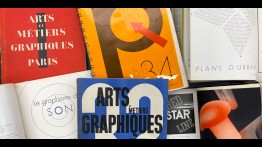Le Graphisme chez Deberny et Peignot
Monday, March 11, 2024, 12:30 - 2:30pm

Le Graphisme is visual communication present in all spheres of everyday life. Essentially, it is graphic design. In the case of the French design journal Arts et Métiers Graphiques, design reporting was filtered through a specific Parisian gaze. Charles Peignot, head of the typefoundry Deberny et Peignot, published AMG from 1927 to 1939. It became a top international magazine for bibliophiles, typographers, and designers. Its wonderfully varied content provides a rare holistic view of developments in inter-world-war European graphic arts. This lecture will trace the influence of Arts et Métiers Graphiques through vivid reproductions, drawn from holdings at the RIT Cary Graphic Arts Collection.
Amelia Fontanel is a curator at the RIT Cary Graphic Arts Collection, a renowned library that collects on design, typography, and the book arts. She is an art historian and editor who contributes numerous publications, including those about graphic design, calligraphy, wood type, and typefounding. As manager of the Cary technology collection, she is responsible for teaching and maintaining vintage presses and thousands of fonts of type. She is actively involved in the letterpress community, holding past board and executive positions with the American Printing History Association and the Hamilton Wood Type and Printing Museum.




